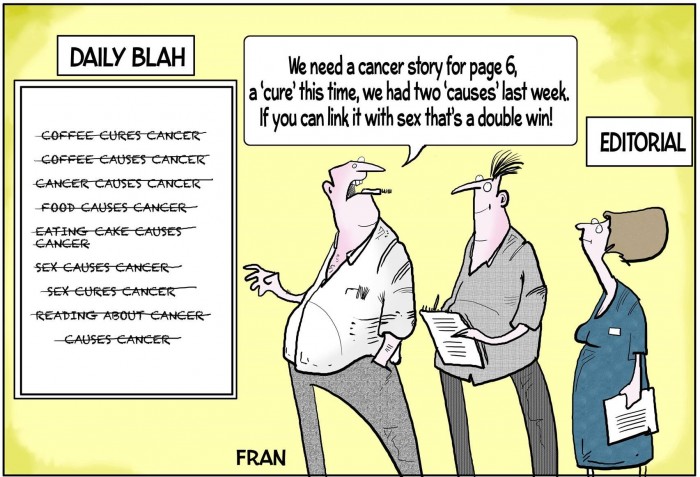It is a truth, universally acknowledged by healthcare professionals, that an interesting and innovative medical research finding can become sensationalised with its ‘passage’ through the popular media (1).
So it has been with a recent study on the effects of a herpesvirus-based immunotherapy for advanced melanoma (2). In May 2015, the findings of a study were published in the Journal of Clinical Oncology (JCO) and presented at the recent meeting of the American Society of Clinical Oncology (ASCO) (2). This large international multi-centre, phase 3 clinical trial, involved researchers and patients from the UK, USA and South Africa (2).
Talimogene laherparepvec (T-VEC) is a type-1 herpes simplex virus (HSV-1)-derived immunotherapy, designed to replicate within the tumour cell. The result is to produce granulocyte macrophage colony-stimulating factor (GM-CSF) to stimulate and enhance a systemic immune response. The study reported some success in the response of stage III and IV melanoma in patients studied (2). T-VEC was reported as the first oncolytic immunotherapy to demonstrate therapeutic benefit in melanoma in a phase 3 clinical trial (2).
Several online news reports, including in The Guardian, have stated boldly that, ‘Patients with aggressive skin cancer have been treated successfully using a drug based on the herpes virus,’ and some have even described this as a ‘cure.’ (3, 4) These examples are not just inaccurate reporting; they represent, as Mark Twain may have put it, the modern media’s imperative to, ‘Never let the truth get in the way of a good story’ (5). A recent comment, on the hazards of the urgency to publish news online, comes from none other than a British professor of journalism, who has described this writing style as, ‘copy thrown online with a photo’(6).
Sensationalised news reporting does a disservice to medical research and patients. Melanoma is an aggressive form of skin malignancy that has a poor prognosis, particularly when it is diagnosed at a late stage. The incidence of melanoma in the UK has been increasing in the past 30 years. The National Cancer Intelligence Network (NCIN) has compiled statistics on the incidence of melanoma and reports that the in men, melanoma is increasing more rapidly than in women, particularly over the age of 65 years (7). The differential between mortality from melanoma in men and women is more marked than the incidence (7). Awareness of the dangers of excess sun exposure and the availability of information provided by the NHS about melanoma does not seem to be having an effect on this increasing incidence (8).
The use of immunotherapy to treat melanoma has a sound scientific basis (9). Melanoma is typically associated an infiltrate of chronic inflammatory cells and the degree of lymphocytic infiltrate may be associated with improved tumour prognosis (9). The history of immunotherapy in melanoma includes the use of adjuvant local treatments, such as bacillus Calmette-Guérin (BCG), IFN-α, and IFN-α2b, and more recently, inhibition of key T-lymphocyte immune checkpoints, including PD-1/PD-L1 and CTLA-4 (9).
It is possible to separate the facts about the T-VEC/melanoma study from the media sensation, by reading the publication (2). The study included 436 adults (average age 63-64 years) with advanced melanoma that was not suitable for treatment by surgical removal (2). Patients were randomised to receive either T-VEC injections directly into the tumour or subcutaneous GM-CSF injections (2). Treatment was continued for 24 weeks, regardless of disease progression (2). After 24 weeks, treatment was continued until there was disease progression, remission, lack of response, or intolerability (2). At one year, patients with stable or responsive disease could continue treatment for a further six months (2).
The results of the trial were that significantly more people responded T-VEC treatment for more than six months (16.3%) than with GM-CSF injections (2.1%) (2). Overall survival improved on T-VEC treatment but had a low confidence level, only just reaching statistical significance (2). Average patient survival was 23.3 months with T-VEC treatment, compared with 18.9 months with GM-CSF treatment (2).
The authors discussed some other limitations to the interpretation of this study (2). The main limitations are:
- No patients were ‘cured’ of their advanced melanoma. Most of the patients studied died of their advanced melanoma during the two years of follow-up; the patients receiving T-VEC lived slightly longer.
- As T-VEC boosts GM-CSF production within the tumour, it was compared with GM-CSF injections. GM-CSF is not a standard treatment for advanced melanoma, so the study did not compare the effects of T-VEC with standard treatment (chemotherapy or radiotherapy or antibody therapy, such as ipilimumab).
- T-VEC is a genetically engineered derivative of HSV-1; this is not the same as being infected with HSV-1. So, despite the news headlines, getting ‘cold sores’ will not protect you from melanoma or cancer (10).
What is clear is that the prevention of melanoma, from a young age, is more effective than cure. As the NHS advises, the avoidance of overexposure to the sun or artificial sources of ultraviolet light (sunbeds) will reduce the risk of melanoma (8).
If you would like to comment on any of the issues raised by this article, particularly from your own experience or insight, Healthcare-Arena would welcome your views.
References
(1) Jane Austen (1813). Pride and Prejudice. http://www.austen.com/pride/vol1ch01.htm Accessed June 16, 2015
(2) Andtbacka RH, Kaufman HL, Collichio F, et al. Talimogene Laherparepvec Improves Durable Response Rate in Patients With Advanced Melanoma. J Clin Oncol Published online May 26 2015. JCO.2014.58.3377. http://www.ncbi.nlm.nih.gov/pubmed/26014293 Accessed June 16, 2015
(3) Devlin H. Virotherapy: skin cancer successfully treated with herpes-based drug. The Guardian, May 27, 2015 http://www.theguardian.com/science/2015/may/26/skin-cancer-patients-successfully-treated-with-herpes-based-drug Accessed June 16, 2015
(4) Knapton S. Genetically engineered virus ‘cures’ patients of skin cancer. The Daily Telegraph. May 27, 2015. http://www.telegraph.co.uk/news/science/science-news/11631626/v.html Accessed June 16, 2015
(5) Mark Twain. http://www.goodreads.com/author/show/1244.Mark_Twain Accessed June 16, 2015
(6) Greenslade R. The reality of digital newsrooms: ‘copy thrown online with a photo.’ The Guardian. Jan 14, 2014. http://www.theguardian.com/media/greenslade/2014/jan/14/newspapers-digital-media Accessed June 16, 2015
(7) National Cancer Intelligence Network (NCIN). Mortality, incidence and gender – melanoma. http://www.ncin.org.uk/publications/data_briefings/mortality_incidence_and_gender_malignant_melanoma Accessed June 16, 2015
(8) NHS Choices. Protect your skin and eyes in the sun. http://www.nhs.uk/livewell/skin/pages/sunsafe.aspx Accessed June 16, 2015
(9) Trozzi PL et al. Re-inventing intratumoral immunotherapy for melanoma. Immunotherapy 2011;3:653-71. http://www.ncbi.nlm.nih.gov/pubmed/21554094 Accessed June 16, 2015
(10) Cold sores: the new cure for skin cancer? Channel 4 News online. May 27, 2015. http://www.channel4.com/news/cold-sore-virus-skin-cancer-herpes-treatment-melanoma Accessed June 16, 2015









